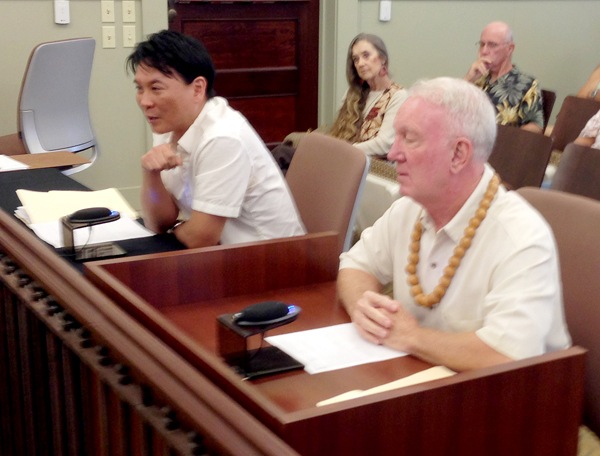LIHU‘E — The Kaua‘i County Council landed a right hook against one of Hawai‘i’s most lethal and undetected killers, the hepatitis B virus. The council on Wednesday unanimously approved a resolution supporting a nonprofit’s efforts to wipe hepatitis B off
LIHU‘E — The Kaua‘i County Council landed a right hook against one of Hawai‘i’s most lethal and undetected killers, the hepatitis B virus. The council on Wednesday unanimously approved a resolution supporting a nonprofit’s efforts to wipe hepatitis B off the island through the “Hepatitis B Elimination Project.”
“The most common cause of liver cancer in Hawai‘i is hepatitis B,” Malama Pono Executive Director DQ Jackson said. “Hawai‘i has the highest rate of liver cancer in the United States.”
Malama Pono Health Services’ mission is to use education to stop the spread of viral hepatitis and other sexually transmitted diseases on Kaua‘i, and to serve people affected by those diseases, according to Jackson.
The nonprofit is launching a three-year, $400,000 education project aimed at eliminating hepatitis B as a transmissible disease on Kaua‘i. Hepatitis B is incurable, but it is treatable and the vaccination is “highly effective” for decades, he said.
“We are here today to ask your moral support for this project,” Jackson told the council. “We ask you to use your high standing in the community to encourage at-risk persons to be screened and to be vaccinated.”
Resolution 2012-60, introduced by Councilman KipuKai Kuali‘i, encourages people to get tested for hepatitis B. The resolution states the virus is transmitted through blood and infected bodily fluids, which can occur through direct blood-to-blood contact, unprotected sex, use of unsterile needles and from an infected mother to the newborn during delivery.
“The liver is such an important organ that the human body can only survive one or two days if the liver were to shut down,” the resolution states.
Malama Pono Board of Directors President and Medical Director Jimmy Yoon said, conservatively, approximately 400 million people in the world are infected with hepatitis B virus, translating to more than 5 percent of the entire world’s population. In the U.S. alone, there are at least 2 million people infected.
“Unfortunately it’s a silent killer; people don’t get sick or feel sick or has symptoms until it’s virtually too late,” Yoon said.
Malama Pono’s best estimate, through consultation with the federal Centers for Disease Control and the Hawai‘i Department of Health, is that there are about 1,000 people on Kaua‘i who are infected with the virus, according to Yoon. Statewide, it is estimated that about 40,000 people live with the virus.
“The cost of a single case of liver cancer is very high, beginning at least at a $100,000 for a transplant,” said Jackson, adding that each year thereafter, patients could spend an additional $50,000 in continuing treatment.
Because each patient responds different to the disease, it’s hard to say the exact cost of treatment, which depends on the level of surgery needed, Jackson said. Comparing to AIDS treatment, he said, it is known that the lifetime cost of treating HIV infection (the virus that causes AIDS) is approximately $374,000.
Malama Pono’s project seeks to prevent “scores of cases” of liver cancer, according to Jackson.
“Savings in health care dollars will be in the multi millions, but that pales in comparison to the savings in human suffering,” he said.
Some of those who are most at risk are people born in countries where the disease is endemic or are children of people born in those countries, such as the Philippines, West Samoa and Marshall Islands, according to Jackson.
He said he encourages those who are born on those islands to be screened, and Malama Pono wants to make sure they are taken care of if it turns out they are chronically infected.
Yoon said the three-vaccination series runs in the neighborhood of a couple of hundred dollars, but the cost ultimately depends on insurance benefits, and there could be even eligibility for free shots.
If pregnant women are infected with the virus, treatment begins at the child’s birth, including vaccination on the spot to prevent babies, who have an “immature immune system,” from becoming infected, according to Jackson.
“This is a miserable disease that is very, very expensive (to treat),” Jackson said. “Two thirds of infected people just don’t know (the are infected); those are the people we want to educate.”
Jackson also reminded the council that Dec. 1, which is Saturday, is World AIDS Day.
“We recognize that day in order to remember the more than 300 people who died from AIDS on Kaua‘i,” he said.
Visit the website www.malama-pono.org for more information.
• Léo Azambuja, staff writer, can be reached at 245-3681 (ext. 252) or lazambuja@ thegardenisland.com.


